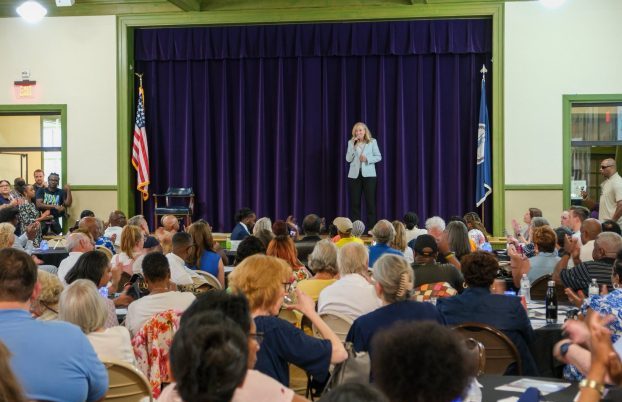Trent speaks about King, Johns
Published 11:29 am Thursday, January 24, 2019

- Sydney Trent, The Washington Post social issues editor and goddaughter of Barbara Rose Johns, speaks about her family and Dr. Martin Luther King Jr. during a keynote address at Longwood University. (Photo by Emily Hollingsworth)
Sydney Trent, longtime Washington Post social issues editor and goddaughter of Barbara Rose Johns, addressed community members and students at Longwood University Tuesday evening. Trent was the keynote speaker for a series of events the university is holding throughout the week to honor Dr. Martin Luther King Jr.
After Trent spoke, there was a question and answer portion where members of the audience asked questions about Trent, her career, experiencing racism in her own lifetime and about Barbara Johns. Joan Johns Cobbs, Barbara’s sister, answered a question about Barbara.
Longwood President W. Taylor Reveley IV introduced the event and Dr. Jes Simmons, assistant director of Citizen Leadership and Social Justice Education at Longwood University, introduced Trent.
Trent, during her address, spoke about drawing inspiration from her family. She said in late 2016 she placed a portrait of Barbara Johns and Vernon Johns on her desk.
She described how her grandfather, Vernon Johns, and her first cousin once removed, Barbara Rose Johns, stood against racial injustice. Barbara, at 16, organized a student walkout at Robert Russa Moton High School, the all-black high school at the time, to protest the unequal conditions, services and treatment of the Robert Russa Moton High School compared with the all-white high school. Trent said she remembered Barbara Johns as someone who was wise, perceptive and warm. Trent said as an adult, she was able to further connect with Barbara by visiting her up until Barbara died of cancer.
‘HAVE YOU CONSIDERED THE MOUNTAIN?’
Trent drew from sermons and journal entries given by Vernon Johns, Dr. King and Barbara Johns to describe mountaintop imagination, a phenomenon she detailed as viewing the world, the United States’ racial history, and one’s circumstances from a high moral perspective, from a belief in what’s right that transcends the noise that can come from society. From that perspective, Trent said, people receive a clearer picture of history, see what needs be done to stand up for justice, and move past fear.
“How do we arrive there from where we are?” Trent asked the audience. “How can we find a way to rise above the times we are living in to see the truth and find the guidance we need to elevate our minds and our hearts?”
Trent said Altona Trent Johns, Vernon’s wife, would ask Trent’s mother, “Have you considered the mountains?”
Trent said Altona referenced mountains because she and her mother grew up in Asheville, North Carolina, and because of the spiritual significance of mountains for power and perspective.
Quoting Vernon Johns’ sermon, “Transfigured Moments,” Trent read, “It is good to be present when the great, distant peaks of history join hands to point the way of life: when seers, standing in different ages and places, one on Sinai another on Carmel and another on Olivet, come together to speak to us out of the wisdom of the ages concerning the way and the meaning of life. All this is the privilege of those who frequent the heights! Up there we can read history with our eyes instead of our prejudices. Up there we do not hear the clamor of time-servers and self-servers: and as we look down from the heights, it is too far to descry the hue of faces or the peculiarity of skulls, all we can see is the forms of men, toiling or contending in the valleys: swayed by the same hopes and fears, the same joys and sorrows.”
“Too often, history strikes us as a medley of blind and futile ramblings. ‘A tale told by an idiot amid great sound and fury, signifying nothing.’ ‘The drift of the Maker is dark,’” Trent read. “But on the mountain top, perspective is possible; above the confusion of the plains, the visitant beholds Moses in one age, Elijah in another, Jesus, Luther and Lincoln, each in another; all joining hands across the Ages and moving humanity in the direction of that “one far off, divine event to which the whole creation moves.”
Vernon Johns’ sermon was the first sermon written by a person of color to be included in the annual anthology “Best Sermons.”
Trent also quoted from the last sermon Dr. King held in April 1968 at a strike for sanitation workers in Memphis, Tennessee. The sermon is called, “I’ve Been to the Mountaintop.”
“I don’t know what will happen now,” Trent read of King’s sermon. “We’ve got some difficult days ahead. But it doesn’t matter with me now. Because I’ve been to the mountaintop. And I don’t mind. Like anybody, I would like to live a long life. Longevity has its place. But I’m not concerned about that now. I just want to do God’s will. And He’s allowed me to go up to the mountain. And I’ve looked over. And I’ve seen the promised land. I may not get there with you. But I want you to know tonight, that we, as a people, will get to the promised land.”
Trent said she wrote a feature for Washington Post about Barbara Johns called “Stand and Deliver.” She was able to obtain a journal entry about Barbara, in which Barbara experienced her own mountaintop imagination about the circumstances surrounding the deplorable condition of her school.
Barbara, in the entry, described how after months of thinking and praying for solutions, the idea for the strike came to her. Trent said Barbara described the idea as being “given to her.”
‘COLLECTIVE AMNESIA’
Trent said viewing society’s injustices from a mountaintop perspective is necessary in current society, both to address racism rather than shirk its reality, and to seek justice through creative and brave solutions.
Trent said the United States has a way of forgetting its history in a way that feels almost intentional, like a “collective amnesia.” In some ways, Trent said this is positive. It allows society to move forward optimistically. However, Trent said forgetting or avoiding aspects of United States history, such as slavery, fails to address very real issues that come from racism.
She said peoples’ way of protecting themselves against discussing racism, its discomfort and one’s passive or active participation in it, holds society back rather than move it forward.
She said viewing this history at a mountaintop view allows some to view history from a distance and to loosen self-defensiveness.
QUESTIONS AND ANSWERS
During the question and answer period, one member of the audience asked what people can do to combat racism or encourage diversity.
Trent encouraged people to form close relationships with those different from them. She also encouraged people to read and view media by people with different experiences and perspectives.
One member of the audience asked what it was like to work at Washington Post while the press has faced increased criticism
Trent said it can be difficult and stressful, but said the newspaper’s goal of obtaining truth is commendable.
One member of the audience asked what motivates Trent.
She said seeing beauty in everyday life, and the ability to enact change in her career. She described laws changed in Virginia and Maryland after she and others wrote pieces about people poisoned by lead who were taken advantage of by insurance companies. The companies often left the victims with nothing.
One person in the audience asked how Barbara Johns responded to civil rights later in her life.
Joan Johns Cobbs, Barbara’s sister, answered. Cobbs said Barbara was concerned about the hundreds of students, the majority of whom were African-American, denied education for five years when Prince Edward Public Schools closed between 1959-1964 as resistance toward school integration.





